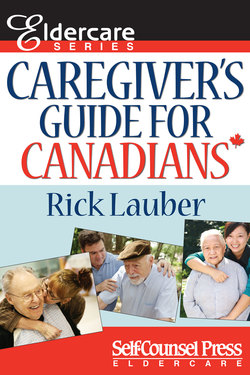Читать книгу Caregiver's Guide for Canadians - Rick Lauber - Страница 3
На сайте Литреса книга снята с продажи.
Preface
ОглавлениеMy decision to write this book was prompted by a situation that is not going away — caregiving. Canada’s population is rapidly aging, which means sons and daughters are scrambling to find and provide suitable care for their own parents. Unless these family members have been fortunate enough to work in the health-care field, they often lack the necessary skills, attitudes, and experience to adequately help.
There is a huge sense of responsibility, obligation, and even guilt for these adult children who may silently believe, “Mom and Dad cared for me; now it’s my turn.” In turning the tables, adult children do what they can but must frequently learn “on the job” while giving their parents the best possible quality of life. Commonly, family members serving as caregivers suffer from a sense of imbalance, stress, and myriad emotions that include anger, depression, confusion, and grief. This is certainly not the best for either the caregivers or the parents.
Whether you are becoming a caregiver, anticipate eventually taking on the role, or know of someone else providing parental care, you are likely entering into foreign territory. There is no road map or tour guide to steer you. As a caregiver, you will be called on to make difficult lifestyle, health-care, and financial decisions affecting your own parents. You will struggle and deliberate as to whether you made the right choice. Learn to accept your own decisions, your own shortcomings (you cannot do it all for your parent), and the crucial importance of personal respite (i.e., taking a personal break).
Trust me, this is not easy! I’ve walked in your shoes, serving as a caregiver not once, but twice — for both of my aging parents. My Mom had leukemia and my Dad had Alzheimer’s disease. Through my experiences, I have gained a newfound respect for all of those working in care — specifically, for untrained family members (like me) who, often, have been thrust unknowingly into a caregiving role. I have also gained more respect for myself and know far better my own limits and strengths — as well as when it is necessary to take a break.
As you look ahead with uncertainty or trepidation, know that this is not a typical self-help book which simply aims to encourage or inspire you. The issues I speak of in this book are very real, and the tools and strategies I suggest can be very effective. I will share stories with you as to what caregiving mechanisms were helpful for me, and I will also discuss what was not helpful.
For the sake of conciseness, I have chosen to remember my Dad for the most part throughout. While my Mom’s medical case certainly presented numerous challenges, my Dad simply outlived her and my caregiving responsibilities were extended. Not all of this may be exactly relevant to your own situation, but please glean what you can from it. It is my hope that when you have finished reading this book, you will have learned at least one new thing about what to expect or how to cope as a caregiver.
There are stories of confusion, worry, and neglect that surround the role of caregiving. These stories sadden me, but I would say too that caregiving is not all doom and gloom. While your parent’s situation may seem bleak to you, there is joy to be found here — as you will see in the following pages.
